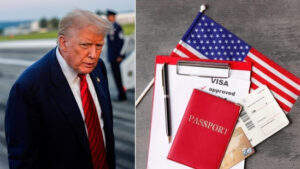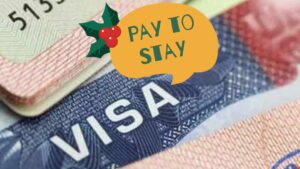Trump’s $15,000 Visa Bond Policy : A Barrier for Global Travelers, Including Indians
Trump’s $15,000 Visa Bond Policy : Why the U.S. is Asking Some Foreign Visitors to Pay a Hefty Deposit and How It Affects Immigration, Global Travel, and India we will understand this in detail.
What is the News about Trump’s $15,000 Visa Bond Policy ?
The United States under Donald Trump’s second term is tightening its immigration controls further.
Among the most debated measures is a new visa bond policy requiring certain foreign visitors to pay up to $15,000 (approximately ₹13.17 lakh) as a refundable bond when applying for a short-term visa.
This initiative is aimed at curbing visa overstays, a persistent concern for the U.S. Department of Homeland Security.
The move, though labelled as a pilot program, is seen as yet another layer of deterrence for legal immigrants and visitors — particularly those from nations with high visa overstay rates or inadequate screening mechanisms.
What Is the Trump’s $15,000 Visa Bond Policy?
Under this policy, U.S. consular officers are now allowed to demand visa applicants from specific countries to post a bond of $5,000, $10,000, or $15,000 as a condition of their visa approval.
This applies to temporary visitors (B1/B2 visa holders) coming for business or tourism.
The bond is refundable, but only if the visitor complies with the visa conditions and leaves the U.S. on time. Those who overstay or violate visa terms risk losing the entire amount.
The rule took effect on August 20 and is set to last for a year, subject to review.

Targeted Nations: Who Is Affected due to Trump’s $15,000 Visa Bond Policy ?
This measure applies to citizens of countries considered high-risk for visa overstays.
These include some African, Asian, and Caribbean nations, where historical data shows higher rates of people overstaying tourist or business visas.
According to a U.S. Department of Homeland Security report:
- Overstay rates for B1/B2 visas are higher than student or work visa categories.
- Countries with limited diplomatic cooperation on repatriation of illegal migrants are also included.
The policy also mentions countries offering “citizenship-by-investment” without residency requirements, which the U.S. views with suspicion.
Although India is not currently listed among the highest overstay nations, the ripple effects on Indian travellers, students, and the business community could still be significant.
India’s Concerns over Trump’s $15,000 Visa Bond Policy : Spillover Effects
While Indian nationals may not be directly targeted by this bond requirement, there are indirect consequences on India are :
A. Perception of Hostility
- This policy adds to the growing perception that the U.S. is no longer as welcoming to foreign visitors and talent.
- This could dissuade Indian entrepreneurs, tech workers, and tourists from choosing the U.S. as a destination.
B. Increased Scrutiny
- Indian travelers already face long wait times and scrutiny in U.S. consulates.
- With heightened security vetting, Indian applicants could be subjected to additional interviews or documentation, even if not asked to pay the bond.
C. Impact on Indian IT and Business Sectors
- Many Indian executives and startup founders travel frequently to the U.S. for meetings, fundraising, or client visits.
- A more complicated visa process can slow down cross-border collaboration and discourage investment.
D. Brain Drain Reversal?
- Such restrictive measures may cause Indian professionals to look toward Canada, the UK, or Australia, where immigration policies are becoming more favorable for skilled migrants.
American Logic behind this Trump’s $15,000 Visa Bond Policy
1. Preventing Visa Overstays
The U.S. sees visa overstays as a major immigration problem, with over 670,000 cases in a single year.
The bond is meant to ensure that visitors leave the country on time, reducing the number of undocumented immigrants.
2. Targeting High-Risk Countries
The policy is aimed at countries with high visa overstay rates or poor cooperation on immigration enforcement.
3. Enhancing National Security
Some countries lack proper vetting and background check systems. The U.S. considers the bond an extra layer of protection when issuing visas to visitors from nations with weak intelligence-sharing.
4. Reducing Enforcement Burden
Immigration enforcement agencies spend significant time and money tracking overstayers. The visa bond is expected to ease this burden by reducing the chances of non-compliance upfront.
5. Testing Through a Pilot Program
The bond policy is a temporary, one-year experiment. The U.S. wants to evaluate its effectiveness before deciding whether to expand, revise, or cancel it altogether.

The Bigger Picture: Trump’s Immigration Legacy
This bond policy is just one part of Trump’s larger immigration overhaul:
- Travel bans were issued against 19 countries, primarily Muslim-majority nations, citing national security.
- Border enforcement was ramped up, including the controversial wall along the Mexico border.
- Legal immigration pathways — including H1-B visas, green cards, and family-based immigration — saw delays, restrictions, and changing eligibility criteria.
In 2020, Trump suspended new green card issuance and certain work visas citing the COVID-19 job crisis.
These policies, collectively, reflect a shift from welcoming skilled immigration to prioritizing enforcement and restriction.
Impact on Global Travel and the U.S. Economy
The backlash to such policies has already begun:
- Air travel to the U.S. declined by 20% year-on-year from neighboring countries like Canada and Mexico.
- Transatlantic airfares dropped to pre-COVID levels due to falling demand.
- U.S. tourism and retail sectors — heavily dependent on international visitors — are also seeing reduced footfall and spending.
This is ironic, considering the U.S. economy is deeply dependent on global talent and tourism.
Many sectors, including tech, research, hospitality, and healthcare, have repeatedly called for more open and predictable immigration policies.
A Policy with Long-Term Consequences
While the Trump administration defends the visa bond policy as a tool to ensure compliance, critics argue it unfairly targets poorer nations and makes legal travel harder.
This Trump’s $15,000 Visa Bond Policy increases financial and procedural barriers, especially for middle-class travellers and small business visitors.
For India, the message is clear: Global mobility is no longer guaranteed — even for legal, short-term travel.
As the U.S. tightens its doors, India may need to strengthen its bilateral engagement, push for fairer treatment of its citizens, and prepare alternative global routes for its business, tech, and academic communities.
The policy may be temporary, but the signals it sends about American openness are long-lasting.
Read Also: De-dollarization coming soon and global order shifting.
